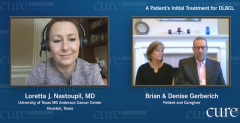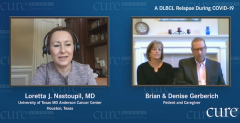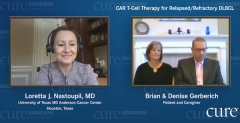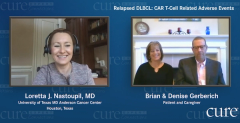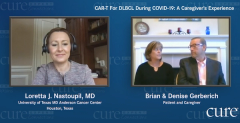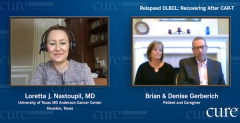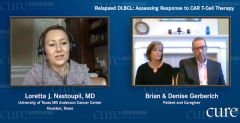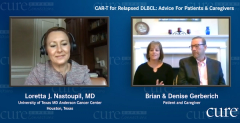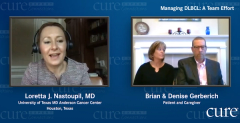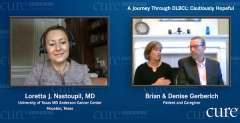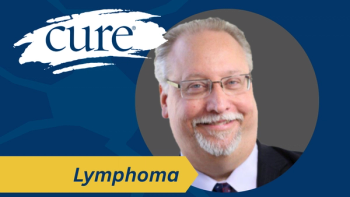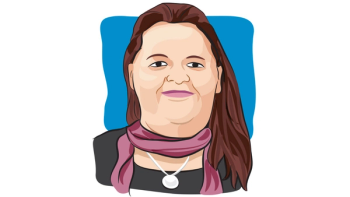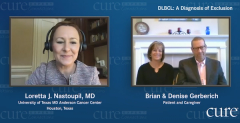
Relapsed DLBCL: Assessing Response to CAR-T
Episodes in this series

Loretta J. Nastoupil, MD: We generally follow patients a couple times a week, sometimes once a week, depending on laboratory test results or symptoms up until day 30, and that’s an average. Some patients will be seen on day 28, some patients on day 35. But right around day 30, that’s when we have our first response assessment. We also want to see patients to make sure that the acute toxicity has fully resolved or is quite close to resolving, and we don’t have any late problems arising. What was that visit like?
Brian Gerberich: We did a PET [positron emission tomography] scan, and it was dramatic. Looking at the PET scan was amazing to see how things prior to the CAR-T [chimeric antigen receptor-T cell therapy] really lit up and then just a few weeks later, it was a dramatic change. We were astounded. We didn’t have any idea it would be that dramatic.
Denise Gerberich: And that quickly.
Brian Gerberich: And that fast, too. It was amazing.
Loretta J. Nastoupil, MD: You’re right, you had a complete response on that day 30 PET, which is what we’re all hoping for and super excited to see. And then we let you go home at that point. And what has it been like since you were discharged from our care?
Brian Gerberich: Great, really great. Again, I feel like I’m almost back to normal as far as energy and strength. My job entails a lot of energy spent during the day. I’m back to normal as far as work goes, and no side effects that I can feel or notice.
Loretta J. Nastoupil, MD: Moving forward, what we counsel patients about is the late toxicity of CAR-T. Essentially we’re going to wipe out all your mature B cells, and that is true for about six to 18 months. That can vary from one person to the next. That can lead to something called hypogammaglobulinemia.
When B cells are performing normally, they make antibodies, so when we wipe out B cells for a temporary period, antibody levels plummet. I’ve had patients who are susceptible to viral infections, including having recurrent viral infections because they don’t build that antibody response.
Outside of COVID-19 [coronavirus disease 2019] times, it’s probably been most notable in my patients who have young children who are generally bringing home viruses. But I would say most patients do very well. It’s particularly nerve wracking in the setting of a viral pandemic. What has that been like for you in the era of COVID-19?
Brian Gerberich: I’m hypersensitive. I’m very careful about my environment and making sure I’m washing my hands. It’s in the forefront of my mind, really, to be careful and cautious the best that we can. Denise is a teacher, she’s with a lot of “germy” kids, and so we try to be as cautious as we can, but so far so good.
Loretta J. Nastoupil, MD: In addition to things like COVID-19, we advise patients to stay on prophylactic antibiotics and antivirals, so prophylaxis for PJP [pneumocystis jiroveci pneumonia], pneumonia or bronchitis, and then prophylaxis against shingles reactivation. And so that we advise patients to stay on for a minimum of a year, sometimes longer depending on how long it takes for those counts to recover.
We’ve seen some late infections, including infections that happen beyond the first few months, and that can linger for several months into this.
The other thing we’re watching for, and not necessarily at this point in time but over the next few years, is the development of second cancers. That’s a challenging discussion to have. But patients with lymphoma are more susceptible to second cancers.
Fortunately, they’re most commonly basal cell or squamous cell cancers of the skin, so those are the nonmelanoma skin cancers. But we have seen patients who also have melanoma skin cancers. Any solid tumor is a possibility, and then what we worry the most about are treatment-related changes to the bone marrow, something called myelodysplastic syndrome, or even acute leukemia.
These are things that we feel particularly bad about, because we think that you’re on the path to cure, and so we’ll be mindful and watching for second cancers for the rest of your life. But I’m very optimistic that you’re going to do very well.
Transcript Edited for Clarity

